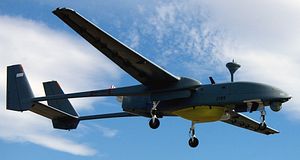India is speeding up its plans to purchase unmanned combat aerial vehicles (UCAV) from Israel, according to recent reports. As The Diplomat recently reported, the Indian government approved the procurement of ten Israeli Heron TP UCAVs for the Indian Air Force in a deal valued at $400 million earlier this month. The plan to purchase armed drones from Israel was originally conceived of in 2012. The new plans to accelerate the purchase of Israeli Herons comes a few short weeks after Pakistan announced that, for the first time ever, it had used its indigenously designed Burraq drone to strike at terrorists on its own soil.
The Heron, built by Israel Aerospace Industries, is a medium-albite, long-endurance UCAV. It has a range of roughly 7,400 kilometers and a maximum continuous flight time of around 36 hours, weather permitting. The UCAV is well-suited for intelligence, surveillance, and reconnaissance (ISR) missions, and is capable of long-range limited strikes as well. The Heron is capable of serving a 1,000 kg payload. The Indian variant will feature air-to-ground missiles. India’s primary use case for the Herons will be for high-risk cross-border covert operations against militants and insurgents. One former Indian Air Force chief, P.V. Naik, notes that “Instead of sending a pilot in a high-risk area, it is best to use an armed drone. The system can also be used for a surprise, sneak attack.”
Beyond its plan to operate Israeli Herons, India’s Defense Research and Development Organization (DRDO) has been developing a UCAV for some time now as well. The Rustom is a medium-altitude long-endurance UCAV which was first tested in late 2009 and is designed for use by the Indian Air Force, Army, and Navy. The Rustom remains years away from combat-readiness and the Herons will form the backbone of India’s UCAV abilities in the meantime. As Franz-Stefan Gady noted recently in The Diplomat, “India is already operating a total of 176 Israel-made drones including 108 IAI Searchers and 68 unarmed Heron-1 aircraft for surveillance and reconnaissance missions.”
The adoption of UCAVs on both sides of the disputed Line of Control (LoC) could possibly raise the risk of armed confrontation between India and Pakistan. Pakistan’s Burraq and India’s Heron/Rustom drones will give both countries the ability to stage deep-strike missions into the other’s territory. India and Pakistan regularly exchange fire across the LoC.
































